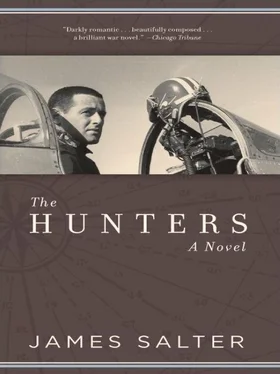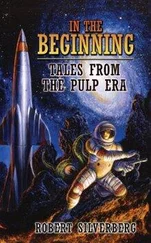Even time stood still for Pell, and the constellations froze. During the five days he was in Tokyo, there was no major fight, hardly even a sighting. The very skies hung quiet while he was gone. When he returned, his accomplishments were still the freshest, his name the most spoken. Everything was exactly as it had been when he left, with one exception. He was not. He had changed. That triumphant week had given him something he had never possessed, a hard luster for his assurance. He had become the final Pell, full grown, immutable. If he had seemed frail, he was no sturdier, but that flicking slightness now had an infrangible quality, like cable. He was established. If still shadowed by the ordinary perils, there was one at least he was now fully beyond: disregard. Everybody knew Pell, and he gloried in it. He drank it, like the can of cold beer that his crew chief would hand up to the cockpit when he taxied in, following a mission at the end of the day. He ate it, beneath his picture in the mess, framed and titled along with those of the other aces there had been, all of them indestructible and dramatic in grays and blacks. He wore it, the aristocratic shield that every man recognized, a line of five red stars painted on his plane just beneath the cockpit.
In the evening they stopped by the room to have a drink and talk or to hear Pell soliloquize, smoking his cigars. They sat around him, and the smoke rose in a canopy beneath the ceiling. They listened. It had been a george deal, Pell told them. He had met the top brass in Tokyo, the boys who were really running this war. He just wished he’d had the chance to follow up on all the fat leads. There was no telling what couldn’t be done. All they had to do was flick the ash off their cigarettes and pick up the telephone to arrange anything, and they were all calling him Doctor. There was this admiral, for one, who wanted him to come out to the carriers on a kind of exchange deal and fly with them for a while. The admiral had said he could easily fix the whole thing up with the commander of the carrier force, if Pell agreed to do it. A few strings might have to be pulled, of course, but it could be arranged. The colonels who were handling things for him in Tokyo didn’t think too much of the idea, though, Pell said. One of them wanted him to finish his tour and then go into operations in the States. He would get him a good job in Air Defense Command Headquarters. They needed someone who knew the fighter business, and there was a good future in it, quick promotion and all that.
“I told him I’d think it over,” Pell explained. “He was an old-timer. I didn’t want to make him feel bad.”
“What’s his name? I wouldn’t mind a job like that.”
“You wouldn’t be in an airplane from one year to the next.”
“Maybe not. Who’s the colonel, though?”
“Never mind,” Pell said. “I’m still thinking it over.”
Colonel Imil had already advised him to continue in a tactical unit when he finished up in Korea. That was good advice, Pell admitted, but it was hard to be sure. It paid to look into everything.
He smoothed his shirt, tucking it in around his belt. Even his uniform seemed to have become distinctive, with the gun belt loose enough so that the loaded holster tugged heavily at his waist and the red satin baseball cap pulled slightly to the side. In a group of any size he could be picked out immediately, even with his back turned. He puffed lightly on the long cigar that was so damaging to illusion. His hands were too effeminate to hold it, and his mouth and face too thin. It was like seeing a jockey with a family.
“We won a few and lost a few, eh, Petti?” Pell said.
Pettibone reddened. He had been quieter than usual since the return.
“How’s the old wound?” Pell asked.
“Never mind.”
“Don’t be that way. Everybody’s interested.”
“Oh, lay off, will you?”
“Let’s have a look,” Pell insisted. “Get under the light here.”
“No.”
“Don’t be like a girl. What are you so shy about?”
“Nothing.”
“You showed it to at least half of Tokyo.”
“Come on, Petti,” someone joined in.
“Lay it on the table.”
“Why don’t you cut it out?” Pettibone said unhappily.
In Tokyo, Pell had gotten him a woman for the first time in his life. It had been in some rambling hotel in the middle of the night, and there had been a great commotion in Pettibone’s room. They rushed to see what it was. When they entered, he was standing testily in the center of the room in only his shorts. Blood was running down his leg. Stains of it were all over the floor and his clothing. Somehow he had split his foreskin, it developed, and he stood there not knowing what to do, while the girl ran for help. In the midst of the confusion, she returned with the hotel manager and others, most of them girls. They stood observing closely, until some bandages were brought. Everyone served as a consultant, examining the progress, and it was almost an hour before the room was cleared.
It was a great story, very funny. Pell told it to everybody. There were stories about him, too, of course. He attracted numbers of them, as a magnet affects metal filings. A whole train of legends had begun to appear.
Hunter spread them. Everything that Pell had said and done he amplified, especially the reception in Tokyo. Actually, he admitted, they had not seen too much of him. It had been a tight program. In the evenings, though, they heard a recounting of who he had been in to see, what he had told them, and what was in the offing. Pell saw nobody but generals, Hunter said. An admiral or two, maybe. He even put in a few good words for the flight, for all of them, Hunter emphasized, with General Muehlke himself. He spent a whole afternoon in the general’s office while colonels waited outside.
The inaccuracies were greater at the club, and when Pettibone came in, he was loudly greeted now.
“Lover!” they called out when they saw him. “Stud!”
Colonel Moncavage stood up and promised he would get the Purple Heart for Pettibone, if proof of injury were shown at the bar. There was a roar of approval and cheers for Pettibone.
“Lay it out there,” somebody urged.
“Show him the stitches.”
Pettibone looked at the floor, flushed and speechless. He yearned for the presence of mind to say something cutting.
“Weren’t any stitches. Pell exaggerates everything,” he murmured.
“You want the Purple Heart?” the colonel said. “Come on.”
The more Cleve saw of it, the more withdrawn he became. Daily, hourly, building up after every mission, during the talks with DeLeo, the evenings in the club, the nights in bed, running through the mind like a stream through the earth, cutting a path for itself, increasing in intensity, growing, dominating everything he did on the major plane of life, he hated Pell. He hated him in a way that allowed no other emotion. It seemed he was born to, and that he had done it from the earliest days of his life, before he ever knew him, before he even existed. Of all the absolutes, Pell was the archetype, confronting him with the unreality and diabolical force of a medieval play, the deathlike, grinning angel risen to claim the very souls of men. When he dwelt upon that, Cleve felt the cool touch of fear. There was no way out. He knew that if Pell were to win, he himself could not survive.
He lived with uneasiness. In the afternoons it had become hot enough to take a cot outside and lie in the sunshine. The waves of heat rolled up and over, as he lay there fevered and stripped to shorts. The traffic pattern was almost directly above him. With closed eyes, the rushing sound of the ships seemed to swell quickly and then start to fade before they were even overhead. It was a trick of the wind.
Читать дальше












